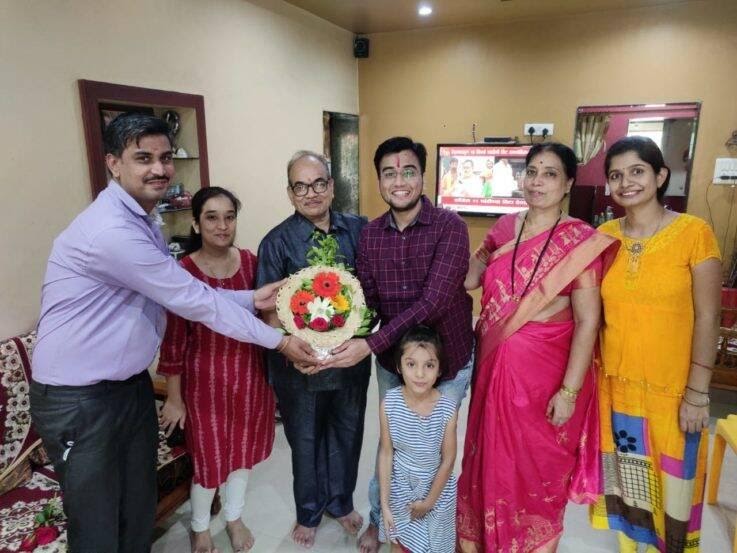(Success Story) First Attempt UPSC Topper – Mandar Patki's Strategy (AIR 22)
(Success Story) First Attempt UPSC Topper – Mandar Patki's Strategy (AIR 22)
Mandar Patki’s UPSC story is what a a million students across India wish it were theirs. Mandar took a year off after college to prepare for his UPSC Civil Services Examination attempt, and at the very first appearance, managed a dream all India rank of 22. This Beed native has pursued a Polytechnic diploma from Government Polytechnic College, Pune, followed by a Btech degree from Vishwakarma University.
Mandar has grown up watching his father work in the Maharashtra State Electricity Distribution Company Limited. True to the technical background of his father, Mandar pursued Mechanical Engineering as a discipline. But halfway through his college days, he realized that his heart lies in administration. Thus, began his UPSC journey.
Mandar’s Strategy :
Mandar emphasizes planning and multiple revisions. He goes on to say that his planning was so airtight that if you asked him in December what portion of the upsc syllabus he would be studying in March, he would be able to tell you exactly. And, if you double-checked with him, you would find him studying exactly that.
Study Sources :
Mandar is a big believer in minimum sources with maximum revision. He stuck by the usual sources for General Studies as well as optional. He read the go-to books such as the NCERT books for classes 6-12, Laxmikanth for Polity, Spectrum for Modern History, Shankar IAS for Environment, and The Hindu for current affairs. He religiously studied current affairs daily and made notes for both the static and current portion of the curriculum. He also made topic-wise notes covering the whole upsc syllabus and all headings and sub-headings mentioned in the UPSC CSE syllabus.
Preliminary Examination :
He made topic-wise short notes for the IAS Prelims syllabus. He kept on revising those notes over and over again. To ensure that they were always handy, he used Evernote – a cloud-based note-making software. He has solved over 60 sectional mock tests and 40 full-length mock tests during his prelims preparation. He insists on taking more than enough tests as not only does it give one confidence, it also helps them get a grasp over the method of solving questions by option elimination. This method can make or break an aspirant’s chances at UPSC CSE.
Mains Examination :
UPSC mains syllabus is incredibly vast for General Studies and can seem mind boggling at first. However, if one notices the syllabus and follows it topic by topic, it is easier to manage. Mandar did the same and made topic-wise notes for the mains General Studies papers as well. He is a big believer in utilizing online video lectures for the more obscure topics and making his own crisp notes for the same. Using his compact notes, he was able to revise the whole mains General Studies syllabus multiple times in the one month before the mains examination.
For mains, Mandar had not joined a test series. He kept on practicing answer writing from day one. Through his practice, he realized how important time management is. He allotted 7 minutes for his 10 mark answers and 11 minutes for the 15 mark answers, ensuring he never ran out of the clock. He advises aspirants to focus on the quality of answer writing, even if they run out of time at the beginning of their preparation. Timing can be improved in due time. And always follow topper’s model answers for inspiration.

Mandar with his family
Essays :
He picked up topper’s model essay notes and used the material and style to enrich his essays. He prepared many examples and case studies on national and international events and personalities. He had prepared a few quotes as well. He even used poetry to enrich his answer. Predefining a few model introductions and conclusions helps one save time as well.
Optional Papers :
Mandar chose Anthropology as it has a very crisp syllabus, with a lot of online and offline resources available. It has also had a very scoring trend over the past few years of UPSC. It also happens to be interesting. He was able to complete it in 3 to 4 months.
Interview :
UPSC DAF is the most important part of your interview and it will guide what questions you are asked in the upsc interview, Mandar says. He also insists one should research their local area’s history and geography, and also about the discipline of studies one has pursued. Mandar faced a very conservative board. He was even asked if students like him choosing to stay unemployed to pursue other careers is the reason for skill India failing. Mandar chose to answer it in all honesty and with extreme humility, ensuring his confidence did not falter. Interview for UPSC is a personality test; it tests an aspirant’s temperament.
Message to Aspirants :
Always prepare with a time-bound goal and have a backup plan. For Mandar, he had given himself 3 years. He had also prepared a little for banking examinations.
There is more to life than your career. Do NOT let it break you.
© IASEXAMPORTAL
CLICK HERE TO DOWNLOAD UPSC TOPPERS NOTES


